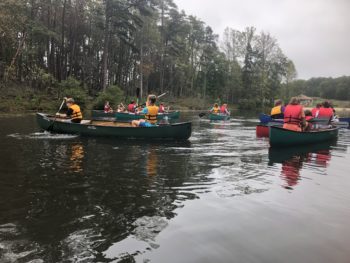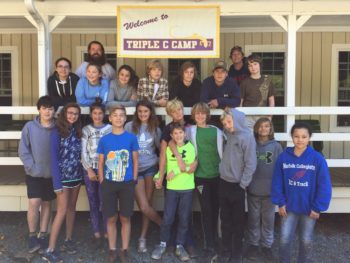Category: uncategorized
Meet the Myers Family!
The Triple C Camp Family has grown by five, recently welcoming the Myers family to Charlottesville. Max and Melissa (Assistant Directors) join us with their three young children (and future campers).
Jude Myers (age 6) is a kindergartner at Cale Elementary, and Pioneer Camper this summer. His favorite part of camp so far is the creek, where he can get muddy. When Jude grows up he wants to be an engineer.
Rory Myers (age 4) loves to ask questions, paint, and play dolls. She cannot wait to be with the horses this summer, and watch the campers at Colt Camp. When Rory grows up she wants to be a doctor with 100 babies!
Wes Myers (age 8 months) will be celebrating his first birthday at camp this summer. His favorite things about camp are all of the soil to put in his mouth, watching the big kids play, and hearing songs.
The Myers family has been exploring Charlottesville, and is excited to have become a part of this amazing community. They have been working hard to discover the best ice cream in town.
A Note From Kasey
It’s 11am at Tullamarine Airport, Melbourne, Australia and I’m waving goodbye to my parents as I’m about to embark on a flight to the U.S.A. The excitement of a new adventure, and the tough goodbyes all happened so fast, that before I could blink, I was setting off on an amazing journey. My head was filled with excitement and curiosity of the unknown: What’s the food like? Will I make friends? Is everything really bigger in America? The list goes on. These were all questions I had going to camp for the first time. Getting to travel around the globe and spend 3 months at Triple C Camp having the traditional summer camp experience was more than I could have imagined! Stepping outside my comfort zone was only the beginning of wonderful opportunities and personal growth.
Fast forward 6 years and I look back on my journey and how it has positively impacted me, and still continues to do so. Just like a child going to camp for the first time, I experienced many of the same feelings, the excitement and nervousness all wrapped into one. But what reassured me that everything was going to be okay, and that I was going to have an exciting time was the pre camp communications and first few minutes I was welcomed at the airport by Triple C Camp’s owner “H”. With a big smile and solid high five, I felt instant relief and knew that coming to camp was going to be the coolest place. As soon as we arrived, I was greeted by smiling staff, all introducing themselves with a handshake, high five, or hug and looking into my eyes, showing that they cared I was there. This welcoming made me instantly feel part of an awesome community.
First impressions make lasting memories. It is these same first impressions that our staff use to connect with your child not only on their first day of camp, but every day after that. We strive to make your child feel safe and excited to be at camp. We see the benefits, first hand, of building healthy relationships, gaining new skills and having experiences which will be carried into their adult lives. It is all about growth and development. With how fast paced and tech savvy our world is, children are experiencing their world in many different ways. However, coming to camp can help us connect not only with our environment, but with each other. Campers learn to build relationships, use social cues, be expressive, use their creativity, and develop their fine and gross motors skills all in an environment that is safe and fun.
There are many reasons why I am so passionate about camp. Over the past 6 years I have been fortunate to be part of many of your children’s lives and during that time I have grown as an individual. The campers have taught me to better understand people, be more patient and understanding, but mostly how to better connect, build relationships and be a positive role model. A role model that children and adults can look up to, someone who can encourage and support, someone who is respectful, yet fun. I am not perfect (as we know, no one is) and camp continues to teach me every day how to be the best person I can be.
I believe that camp teaches everyone something unique. Leaving camp is always hard no matter how old you are. You always leave a piece of you at camp and finishing up the summer is always bitter sweet. I also experience that feeling of wanting to be back, to learn and grow, and this has continued to be part of me since my first summer at camp. Camp has given me new experiences, skills, understanding of people, created wonderful relationships and I have really gained a passion for the camping industry. Looking back, it’s hard to believe that after my first summer I would continue to return and now make camp my everyday adventure. Coming to Triple C Camp opened my world up to new opportunities and encouraged me to dream big, work hard and love coming to work every single day. Thank you to everyone who has been part of my journey so far and I look forward to new successes in camp for many years to come.
Yours in camping,
Kasey
Friendships
 Camp is about fun, learning, being outdoors, and making friends to last a lifetime! We see these friendships blossom among our campers each summer and watching them continue those friendships for years is worth those hot and humid camp days! And, while this happens for our campers, these friendships also form among our staff.
Camp is about fun, learning, being outdoors, and making friends to last a lifetime! We see these friendships blossom among our campers each summer and watching them continue those friendships for years is worth those hot and humid camp days! And, while this happens for our campers, these friendships also form among our staff.
Each summer, approximately 30% of our camp counselors come from abroad. From countries across the world such as Australia and 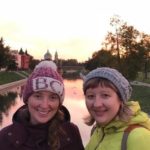 New Zealand, to a bit closer in Mexico. These staff, along with our staff from the States, work together each day to grow and develop our campers, and while that is happening, they grow and develop friendships among themselves.
New Zealand, to a bit closer in Mexico. These staff, along with our staff from the States, work together each day to grow and develop our campers, and while that is happening, they grow and develop friendships among themselves.
As a staff member going on my 13th year, and as a camper for 7 years before that, I have experienced numerous of these friendships, and many continue to go strong to this day. It is because of these friendships, which all started at 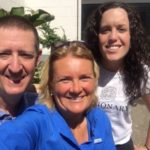 Triple C, I can travel the world and get to see people, see their culture, and experience their lifestyles! As a matter of fact, as I type this, our Owners and Directors, Libby and “H” are Down Under in Australia and New Zealand with a plan to visit 20+ staff. All of whom have worked at camp over the past 19 summers. (See some photos below!)
Triple C, I can travel the world and get to see people, see their culture, and experience their lifestyles! As a matter of fact, as I type this, our Owners and Directors, Libby and “H” are Down Under in Australia and New Zealand with a plan to visit 20+ staff. All of whom have worked at camp over the past 19 summers. (See some photos below!)
Friendships lead to adventure, and adventures lead to lasting memories.  At Triple C, we strive to create those adventures and memories for our campers and staff while they are here at camp, and help build those friendships so that those adventures and memories can keep going for years on end.
At Triple C, we strive to create those adventures and memories for our campers and staff while they are here at camp, and help build those friendships so that those adventures and memories can keep going for years on end.
Williams School 7th Graders Fall event at Triple C Camp
Our experience at Triple C Camp was fun, but it is about more than fun. At camp you learn team building and cooperation. We had so much fun collaborating with all our classmates and getting to know the new ones and becoming closer as a class. On the first day here we did collaboration exercises, climbed the tower, and zipped down the super exciting zip line. One of our classmates was really scared and said she was not going to climb, but Kasey, the Triple C facilitator, supported her and talked her through each of her goal points. In the end, our classmate was successful in her climb and even zipped. We all cheered her on!
You also learn about flexibility and adapting to situations, as hurricane Michael helped us learn. We were to have a full day on the James River and then an overnight camping. This had to change due to the safety of the river. Though we were very sad about not having the camping trip due to weather the counselors had great ideas and activities for us to learn from and made the trip really fun anyway. We went canoeing at Walnut Creek Lake for the day and swam at the beach that we canoed to. Ryan taught us how to throw the rescue throw bag and let us water ski with it. We did water chemistry testing and used secchi disks in the lake.
It was a very good experience and we highly recommend it to anyone. Triple C has great staff, including Rondo and Nika the dogs, which adds on to the experience. All our meals were very yummy. Our night programs were fun too. At our first campfire we cooked s’mores the first night and due to weather we made banana boats in the camp kitchen, the second night. It was the first time any of us had had that type of treat and we thought they were even better.
We are sad to leave Triple C Camp especially since it is our last visit as a class, we came last spring too. We are going to miss the counselors, Kasey, Ryan, Robin, and head director and owner Libby. Eryn too, she is a good cook. We hope Triple C Camp is enjoyed by many more kids like us.
Thank you Triple C for this amazing experience,
Williams School 7th grade
A Deeper Look Into Positive Discipline
Camp has changed significantly since my first year as a Counselor in 1989. Advancements in camp are amazing. Examples include: online registration, drones shooting video footage, cool fun water tramps and climbing devices, Overnight Camps have shorter sessions, and Day Camps Programs growing in numbers every summer. The biggest advancements across the industry are not as obvious. The focus on child development has become the priority for camps that want to positively impact children’s lives.
When I became a director in 1990 (Overnight; Camp Menominee, Eagle River, WI) and Camp Owner 1999 (Day; Triple C Camp, Charlottesville, VA) it was clear there needed to be intentional strategies to support counselors with camper behaviors. By ’99 stereotypically, more campers were acting out and our staff recognized that younger children needed a “camp oriented” plan for discipline support. We found male camper’s parents were turning to medicine to treat their child’s poor behavior vs. problem solving strategies.
When campers want to be at camp (especially overnight camp), there is little need for discipline. They are excited to be involved in the activities and follow their Counselors and the camps’ direction. Many become strong leaders through this healthy environment. Campers get positive attention and love the experience. These campers are normally described by their Counselors as, “these campers are great.” “Great Campers” pay attention, follow directions and want to be good friends to the other campers and staff. However, there are times when any of us could behave imperfectly and it is critical for camps to have a strategy regarding discipline. What’s the plan?
Discipline defined: the practice of training people to obey rules or a code of behavior, using punishment to correct disobedience.
As camping professionals, we need a plan. John Wooden said, “Failing to Plan is planning to fail.” There are a number of camps that choose to operate “by the seat of their pants/without a plan.” Whether it is a plan for discipline, intentional direction for staff about child development, or program schedules. Many directors allow Counselors to “wing it.” Having a plan puts Directors and frontline staff on the same page. There can always be flexibility within the plan; however a starting point is a must. When it comes to discipline, Counselors are in the trenches trying hard to do great work with the campers as their Director desires, however did the Director set staff up for success with an intentional plan?
The strategy below has evolved and worked at our camps for the last 25+ years. It is not perfect, however it is a plan. Have a plan for your staff, role play and teach staff how to use this or any strategy and they will be better prepared to execute.
Priority #1 in positive discipline: make a huge deal out of positive behaviors. Bob Ditter refers to “Connect before you redirect.” Connecting could be a respectful friendly touch, a nod of the head, or an empathetic look, you can use your own strategies, JUST HAVE A PLAN. This is critical in the relationship between camper and staff. Making a connection builds clout with campers when things go imperfectly and they will! When campers meet their Counselors for the first time, it should be celebration for both. Staff are super excited to finally be with campers they have been trained to grow and develop emotionally, mentally and physically. Campers will be excited and nervous to learn about this great leader they have been promised. Counselors need to be proactive in this moment when they meet. Energy, excitement and fun from the staff will instantly let campers know their Counselors are interested in them and will quickly become friends. Also, have your staff welcome with fun visual statements such as name tags, decorations, and fabulous first hour activities including name games help with building relationships at the very beginning. You may ask what this has to do with discipline. When staff are connected to the campers and there is a mutual respect, the need for discipline is minimal.
Positive words have an enormous effect on humans. When someone in charge asks someone to do something, we put into our heads the expectation, very often in the form of a picture. When a person gets asked not to do something, we also put a picture in our head. This is when it can get confusing. If I’m the person in charge and supervising you and say to you, “Please close your eyes and DON’T THINK OF A PINK ELEPHANT!” Did you just think? When we ask a child to NOT DO SOMETHING, why do we expect them to comply? For example, a camper is standing on a picnic bench. Staff says, “Get off the bench!” What does the camper want to do, stand on the bench more. If the staff member says, “Please put your feet on the ground.” The staff member will see much better results from the campers. Be intentional with this training. It takes a lot of practice to become permanent.
There is always a possibility of a camper acting imperfectly! What do we do?
Campers are looking for attention. What type of attention and how we give it to them is ultimately up to staff. Train your staff to make a huge deal out of the positives with campers and to deal with the negatives, do not make a big deal out of the negatives. Campers will fulfill the expectations we set for them. During the first hour or two at camp, make sure that campers are clear on behavior expectations and that staff are clear how to positively reinforce. Make use of the documents such as 100 ways to praise a child. Distribute them during staff training and role play behaviors and expectations.
When a child makes a choice different from what is in his/her best interest and your staff observes said choice, teach staff how to redirect the behavior to a more positive focus. If Johnny is throwing rocks in the creek, and the desired behavior is looking for salamanders, Counselor could say, “Johnny, please come over and help lift this rock and let’s see what’s under it.” Most of the time redirection like this will accomplish the goal of getting the camper back on track. You will notice that the Counselor never said anything about the negative choice (throwing rocks). Staff should focus on the desired behavior. Based on how the Counselor has built a relationship with Johnny before this incident will be a factor/determination how Johnny responds. When we have respect toward campers and they respect staff, redirecting takes place easily without conflict. If a staff member gets push back, it may be due to a lack of respect from the camper. Staff must respect all campers and work on “connecting before redirecting.” The child also may be looking for negative attention and not want to do as the Counselor requested. When this happens, we challenge the staff to NOT mention the negative behavior. Focus on the desired behavior.
If Johnny ignores the Counselor and is still throwing rocks in the creek, we offer Johnny choices. Still never mention throwing rocks, the Counselor would say, “Johnny, you have a choice to make, please come over and help with lifting these rocks and looking for salamanders, or you will have a time out. It is your choice.” We believe in short in sight timeouts. For some campers one minute is sufficient. If Johnny refuses the desired behavior, then the staff member MUST FOLLOW THROUGH and put Johnny in time out. Pick a location that is close where the Counselor can see Johnny and where he will not be a distraction for the rest of the group. After a minute or two, go over and talk with Johnny. Still never mentioning that he was throwing rocks and try to build back a connection that may have been lost by Johnny’s choice to take a time out. Get Johnny back to the desired activity with the other campers as soon as possible and reinforce the next positive action Johnny has to build back so staff can build back anything they may had lost with Johnny.
If Johnny continues to throw rocks in the creek and ignores the Counselors direction for time out (rarely gets this far with kids who want to be at camp), then we give Johnny more choices. “Johnny, please sit on that stump in time out, or you will see the Director. It’s your choice.” Sub consciously the Director is a direct line and contact to Johnny’s parents or family. Again, if Johnny does not make a choice, then the Counselor MUST FOLLOW THROUGH and involve the Camp Director. This allows for the Counselor to focus on the campers that want to have a fun time with the rest of the group and a camper who is looking for negative attention will receive support from the Director so that we can reset expectations with said camper. The Director will go through the stages of conflict resolution with the child and make the Counselor aware of what took place. The Counselor MUST have the support of his/her Director for success. Once the Director has spoken to the child, the camper needs to make restitution with the Counselor or possibly other campers. Tip: Director comes to area where child was misbehaving. If camper has to make the long walk to the office, they may forget the reason they were in trouble or be apologizing all the way.
If two campers are having verbal or physical difficulties, a different approach can be used. First, if campers have made physical contact with each other in a hurtful way, we want the Director to be aware and discuss the plan. We train staff to work it out with the campers; this empowers the staff to focus on group relationships. If two campers are getting on each other’s nerves, staff must keep their eyes and ears open and possibly direct campers to physically put some distance between them short term. Long term, we need to learn how to work with each other. In life individuals must recognize each other’s differences and embrace the other for differences. When campers cannot work out their differences this is when a staff member/Director can help them work through their issues. Very often this skill is beyond that of our teen age or young 20’s staff. Utilize an experienced director and communicate appropriately with parents. When campers return, the group should be addressed. The group should discuss problem solving and choices we make that have real consequences. Processing the experience is an important part of the process.
None of us are perfect. We as Directors must support our staff while working with difficult/all campers. We must partner with parents to help campers grow and develop and understand issues of attention seeking, gaining friendships, and skill development. When imperfect moments arrive, stay the course and support our Counselors. Give them a plan and expect it to be executed. Hold staff accountable to the plan as it is in the best interest of the campers you serve. Then, positively reinforce your staff. We must practice what we are teaching. Camp will be a better place for the campers when you positively reinforce, have a plan for discipline, and staff/campers are aware of expectations and that you as the Director will follow through.
Howard “H” Rothenberg is an ACA Visitor and Co-Owner and Director of Franchise Operations for Hi Five Sports Franchising, Owns Camp Coach (www.campcoach.com) and co-owner of Triple C Camp in Charlottesville, VA. www.tripleccamp.com Reach “H” about anything camp: [email protected]
Countdown to Summer!
45 days until camp! Here are the 45 things we are looking forward to this summer at Triple C!
- PLAYING GAGA
- CAMPFIRE SONGS
- MAKING NEW FRIENDS
- SWIMMING EVERY DAY
- PIZZA STICK LUNCH
- PURPLE VS GOLD COMPETITIONS
- BUILDING FORTS
- SEEING YOUR FAVORITE COUNSELOR
- LEARNING NEW GAMES
- CATCHING LIGHTNING BUGS AT THE OVERNIGHTS
- SITTING NEXT TO YOUR BEST FRIEND ON THE CAMP BUS
- WEDNESDAY DRESS UP
- RAISING THE FLAG AT MORNING OPENING
- CATCHING CRAYFISH AT WATER CHICKEN WAY
- SEEING OLD FRIENDS
- MAKING CREATIVE NOISE AT THE MUSIC CIRCLE
- PLAYING THE “FRIDAY” SONG AT LUNCH ON…WELL…FRIDAY!
- MEETING NEW COUNSELORS
- PLAYING ON THE SLIP AND SLIDE
- TRYING SOMETHING NEW
- SEEING YOUR FRIENDS AS YOU GET OFF THE CAMP BUS
- KNOWING WHAT THE MOST IMPORTANT THING AT CAMP IS
- ALL THE WATERBALLOONS YOU CAN IMAGINE
- WAVING “BYE” TO THE HORSES AS YOU DRIVE OUT OF CAMP
- IMITATING THE INTERNATIONAL COUNSELORS ACCENTS
- SOCCER DODGEBALL
- TRAILBLAZER CHOICE
- PLAYING IN THE RAIN
- GETTING DIRTY AND NOT CARING
- WINNING THE WASTE COMPETITION
- BEING CALLED UP FOR A KUDOS!
- COOKING LUNCH OVER THE CAMPFIRE
- SEEING IF YOU MADE THE DAILY YOUTUBE VIDEO
- WHEN YOUR COUNSELOR GIVES YOU 5 MINUTES ON THE PLAYGROUND
- NEW CAMP TEE SHIRTS
- LEARNING NEW FRIENDSHIP BRACELET PATTERNS
- SMELLING LIKE SUNSCREEN ALL DAY EVERY DAY
- CLIMBING KINSERS
- PREFORMING AT ROUND UP
- WINNING THE BFC
- DRINKING LOTS OF WATER
- FINDING A 4 LEAF CLOVER
- GOING TO ARTS AND CRAFTS EVERY WEEK
- HITTING THE HARDEST TARGET AT THE ROCK RANGE
- HAVING FUN!
The Countdown Begins!
The New Year is here, and with the warm weather we have been having, it certainly feels like summer is just around the corner! 132 days around the corner to be exact!
We have been busy at camp gearing up to make it another fantastic summer. Here is a glimpse at what we have been up to!
Hiring. Every year we hire from all over the world to work with our campers. We have a great mix of returning and new staff.  From Australia, to South Africa, to right down the road in Charlottesville. Every staff member is individually interviewed by our awesome full-time staff. We talk about camp, their experiences, what a Triple C day looks like, and what an amazing experience it is to work with our campers. The hiring process is multi step with accountability and follow thru from our applicants, not to mention all the “regular” things like background and reference checks.
From Australia, to South Africa, to right down the road in Charlottesville. Every staff member is individually interviewed by our awesome full-time staff. We talk about camp, their experiences, what a Triple C day looks like, and what an amazing experience it is to work with our campers. The hiring process is multi step with accountability and follow thru from our applicants, not to mention all the “regular” things like background and reference checks.
Gaining Knowledge. Camp conferences are a big part of our “off season”! We love attending these events around the country to help further our knowledge about the camping industry so that we can pass it on to our campers, giving them the ultimate summer camp experience! We learn about things like: programming trends, liability issues, marketing, risk management, best hiring practices and more. Chris, one our Assistant Directors just ventured to Richmond to recertify his Wilderness First Responder Training. Eryn, Katie and Libby went north to Chevy Chase, MD to attend the American Camp Associations educational conference.
Camp T-shirts. Each summer the Triple C Camp t-shirt changes, designing a new, fun logo for our campers to see! Ideas are thrown around, colors are matched together, and the result is another set of great camp shirts for both our campers and staff!
New Programming Ideas. Every Fall we sit down and go through everything that was learned from the previous summer, suggestions of campers, staff, parents, and what we gain from the conferences we attend, and put together awesome new programming ideas for the upcoming summer. Some of last summers ideas included a rock throwing range, music circle, bouldering wall, and 9Square! There are exciting new things planned for summer of 2018 as well. We love surprises!
suggestions of campers, staff, parents, and what we gain from the conferences we attend, and put together awesome new programming ideas for the upcoming summer. Some of last summers ideas included a rock throwing range, music circle, bouldering wall, and 9Square! There are exciting new things planned for summer of 2018 as well. We love surprises!
Updates to the camp facility. With 1000+ campers, 70+ staff, and 150+ program days that occur throughout the Spring, Summer, and Fall, the Winter is a key time for us to make updates to all the facilities at camp. This includes tightening loose screws, wood chipping, vacuuming up leaves, implementing new storage facilities, building new programming areas and so much more!
Registrations. After the first of the year our registrations for Summer 2018 opened and they are flowing in! It is always exciting to see names of returning campers pop up on the screen, and the names of new campers who will be attending camp for the first time!
Planning for Spring programs and events. While summer is certainly our busiest time of the year, we also have programs and events that occur in the Spring! The first for 2018 is the Albemarle Family Summer Camp Expo at the Double Tree Hotel on February 11th. (We hope to see many of you there!) During the Spring we have many groups on our ropes course, host Birthday Parties, and conference style events. We will have a great week of fun April 2-6 at our Spring Break Camp. (Registration is open! Be sure to secure your spot!) And finally, our Open House on April 15th is a great time to come out to camp, play, visit counselors, and ask any questions you may have.
A Parents’ Perspective
This is my first ever blog post, so I wasn’t sure exactly how to start. So, I began thinking of what Triple C means to my family and wondered how in the world I could put all of those feelings into words. Then one sentence came to mind that somewhat captured how we feel: simply put, Triple C Camp is FAMILY. This is not a place that just “watches” your kids during the day- no, this is a nurturing, caring, supportive learning environment that guides and encourages your children to become better versions of themselves, while having the time of their lives. The kids come home every day dirty, tired and happy- exactly how it should be after a day at camp. During the day, the kids get to experience the variety of activities you’d expect at a high-quality camp, such as archery, swimming, sports, games, nature, exploring, canoeing, arts & crafts, and a challenge course. But, as a parent, I’ve found that it’s the camp culture and diverse staff surrounding the kids while they participate in these activities that are the true blessing of Triple C and why it stands above the rest in my mind. These folks honestly love what they are doing and care very deeply for all the children. They make them feel special, regardless for how long they are able to attend camp. They expect the children to show respect, positive attitudes, and good sportsmanship and they role model these behaviors at all times.
My son began attending Triple C as a rising kindergartner and has attended every summer since; he is now a student at Fork Union Military Academy. This year he has finally realized his dream of becoming a counselor and I think he is even more excited for this year than ever before. I think he says it best: “without Triple C, I wouldn’t be who I am today; my camp counselors were my role models and I wanted to grow up to be just like them. Now I want to be that role model for other kids, even if it’s just one because you don’t know how that will affect their lives for the better.”
Top 5 Most Frequently Asked Questions about Preparing For A Summer At Triple C…And The Answers!
1. Do campers get to swim every day?
Yes! Everyone swims every day! The Pioneer and Trailblazer groups have a structured swim lesson for the first 15 minutes, then recreational swim for the remaining 20-25 minutes. The Explorer groups have a structured pool game for their first 10-15 minutes at the pool, with recreational swim after. Our camp counselors are also in the pool with the campers at all times.
2. What does my camper need to bring each day?
In each campers backpack they will need a water bottle, towel, sunscreen (we recommend putting this in a Ziploc bag if it is a lotion), and clothes to change into after pool. We ask that campers come to camp wearing their bathing suit each day. Males wear their trunks as shorts, while females wear their suit under a shirt and shorts.
3. What happens at a camp overnight?
We offer eight overnights over the course of the summer (Weeks 3-10). Overnights are an awesome extension of the camp day. There will be a delicious camp dinner, extra swim (weather permitting), field games, and s’mores at the campfire before bed! On Friday campers will wake up to a hot camp breakfast and hop right into their camp day.
4. What are some activities that my camper might do during the camp day?
Campers participate in a wide variety of activities during their camp day and week. These include: swimming, arts and crafts, nature, horseback riding, sports, science, hiking, archery, and so much more! A day is generally divided into 8-10 forty minute blocks, which means 8-10 different and awesome activities each day.
5. Do I need to pack a lunch for my camper?
No. Lunch, as well as a morning and afternoon snack, is provided each day. Lunch includes a main entree (kid friendly items such as hot dogs, hamburgers, chicken nuggets, macaroni and cheese, etc.), salad, a vegetable (peas, green beans, corn, etc.), a fruit (pears, peaches, fruit cocktail, etc.), and a “crunch” (pretzel, Frito’s, potato chip, etc.). We also offer peanut butter and jelly sandwiches (or just peanut butter or just jelly) each day.
Experiential Learning at Camp
As the school year begins to wind down, we at Triple C wanted to talk a little bit about the type of education we do at camp. Summer learning loss is a real thing. Over the summer, up to one month worth of information learned at school can be lost (Cooper et al, 1996) while students are on break. At Triple C Camp, we combat summer learning loss with intentional programming. We have many tools at camp to aid us in this battle. One such tool is our challenge course. A challenge course is a combination of mental and physical challenges consisting of high and low elements. Challenge courses have become very popular lately, but have been providing educational experiences for a long time.
In the United States, the first challenge course was built in Boulder, Colorado in 1961. Early challenge courses followed the Outward Bound philosophy of learning through a direct experience with focused reflection. Another key aspect of this learning process, credited to Karl Rohnke, is to help participants push themselves out of their comfort zone and into the stretch (learning) zone during a challenge course program. This model has been successfully used for years to help individuals grow and develop as well as help groups attain outcomes such as better communication, problem solving, and planning skills (Gillis & Speelman, 2008). Today, the challenge course industry is regulated by the Association for Challenge Course Technology (ACCT) which sets standards and best practices for construction and facilitation of challenge courses.
The scope of the ACCT has grown as the industry has changed. Today, are more than 7500 challenge courses in the U.S., with 200 to 400 new courses being built every year. Many of these newer courses are “pay for play” courses. The goal of these courses has moved away from experiential education to a purely recreational goal. In the past, the educational experience was key. Many of these new courses are about amusement. They pump through high numbers of participants and exclude the facilitation aspect of the program that educates and helps participants grow. These pay for play courses have their purpose, but at Triple C, we use our course as a tool for the development of our participants.
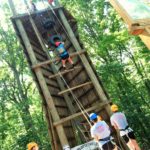 On our challenge course you can traverse sideways while leaning into a partner, standing two feet off the ground on a cable. It’s called the Wild Woozey and it promotes planning before proceeding on the element. The “Nessie” is an element where the team has to work together using ropes to move beams that are 35 feet in the air so a participant can walk across the beams (while harnessed in to a rope and belayer). It requires clear and concise communication from the team on the ground to help the participant successfully cross the beams. We have a climbing tower and 500 foot zipline that promotes goal setting. There are numerous similar elements and activities that help teams work together and help individuals grow on our challenge course. The physical elements are less important than the social, mental, and emotional experience though.
On our challenge course you can traverse sideways while leaning into a partner, standing two feet off the ground on a cable. It’s called the Wild Woozey and it promotes planning before proceeding on the element. The “Nessie” is an element where the team has to work together using ropes to move beams that are 35 feet in the air so a participant can walk across the beams (while harnessed in to a rope and belayer). It requires clear and concise communication from the team on the ground to help the participant successfully cross the beams. We have a climbing tower and 500 foot zipline that promotes goal setting. There are numerous similar elements and activities that help teams work together and help individuals grow on our challenge course. The physical elements are less important than the social, mental, and emotional experience though.
During our challenge course programs, our counselors structure each activity to elicit teachable moments that help participants learn about themselves and their team. Throughout the experience, processing occurs where reflection is guided by the counselor. Methods like active listening are combined with tools such as processing thumb balls to stimulate 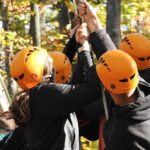 conversation and give the group the means to help themselves work through issues. Processing is structured in a way that begins at a very basic, comfortable level and evolves into more in depth reflection that aids in the growth and development of the group. During summer camp, experiences on our challenge course help to bridge the gap between school months.
conversation and give the group the means to help themselves work through issues. Processing is structured in a way that begins at a very basic, comfortable level and evolves into more in depth reflection that aids in the growth and development of the group. During summer camp, experiences on our challenge course help to bridge the gap between school months.
We also use our course during the non-summer months. We offer birthday parties, corporate teambuilding programs and much more on our challenge course. If you are interested in these educational programs, please contact Shannon Meyers, our Director of Year Round Programs ([email protected]) or visit our Year Round Program website: http://yearround.tripleccamp.com/





